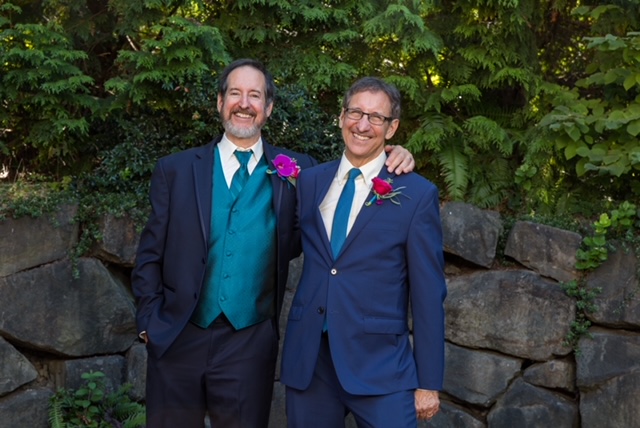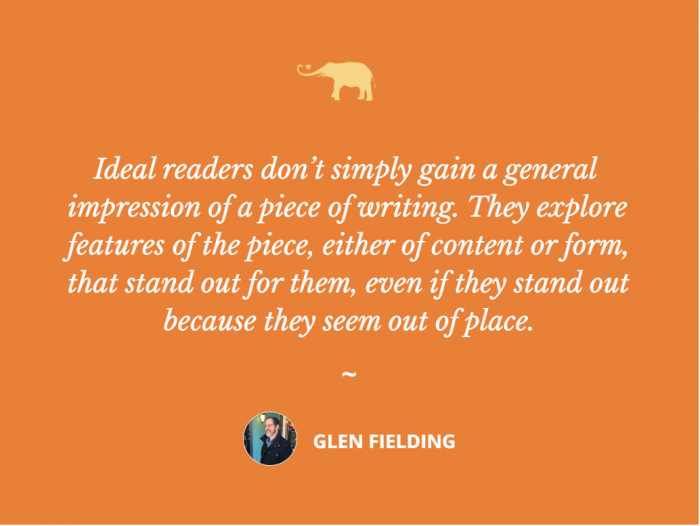“Write for the audience you’d like to have,” a friend in my writing group recently suggested.
I was struck by this advice. I had never thought of imagining my ideal audience, let alone writing for it.
What came to me after letting this moment of possibility percolate was that I didn’t have to think too hard to find my ideal audience. It was already at hand. My brother, Randy, fits the bill. Implicitly, over the last several years, Randy has set the standard as a reader of my essays.
I’m writing this piece to work out why Randy’s stance as a reader works so well for me. Are there qualities he brings to reading that might, if kept clearly in mind, help me extend myself to an audience more confidently and effectively? Might these qualities also resonate with other writers?
An openness to discovery
Many of us read to confirm our biases and reinforce what we already know and believe. We want an author to validate our settled way of seeing ourselves or the world. Randy does not do this.
He asks what he might discover in a piece. He looks to see what might shift or enlarge his perspective or raise questions he might wish to pursue in his own life.
For example, even though Randy does not practice yoga, in response to a recent piece about the different ways I experienced the front and back body in yoga and in life, he wrote:
“The focus on the back body versus the front body is a new concept for me, and it’s illuminating. The seat of intuition—quite an important idea.”
After reading an article in which I spoke about holding space as a silent witnessing of another’s experience, in which the listener resists the urge to offer verbal affirmation or praise, Randy wondered about his own praise-giving practices. Did he praise people as a kind of default, habitual response in situations when praise might get in the way of another’s quiet inner knowing?
A willingness and capacity to stretch one’s own understanding is just the kind of reading trait that my ideal reader would have.
A sensitivity to purpose
Randy matches the feedback he offers me to the purpose my writing is trying to serve. If I’m writing in a professional context, for example, and making an evidence-based argument designed to persuade, explain, or predict something in the outer world, Randy will give me feedback about the validity of my argument.
But I’m now retired, and most of my writing is about personal rather than professional matters. My purpose in this sort of writing is to convey as authentically and clearly as I can what deeply matters to me, what I’m learning from my experience, and how my vulnerabilities and strengths show up in my life. I write to cast light on themes that might hold meaning to others beyond myself. But I’m not generally setting out to convince a reader about the rightness of a position or to assert a verifiable truth.
If I ask Randy how I might improve my personal writing so that my meaning comes across more clearly, smoothly, or fully, he will offer suggestions. I said something last week in a phone conversation, for example, about “embodying a life theme” that caused Randy gently to ask what I meant. Without using terms of judgment, he was letting me know that I was indulging in vague abstractions. Although Randy was giving feedback on a verbal statement, it illustrated the kind of feedback he has constructively offered me on my written work.
Attention to specifics
Randy always singles out specific ideas, images, or examples that speak to him. This makes me feel that he is paying close attention to the writing.
For example, Randy has mentioned to me several times how he found meaning and utility in the concept of “small wins,” which I discussed, along with other concepts, in an essay on the roots of motivation in work and life pursuits. Randy said he related readily to the essay overall. But it was helpful for me to know which specific aspects of the piece he found most relevant and engaging.
Ideal readers don’t simply gain a general impression of a piece of writing. They explore features of the piece, either of content or form, that stand out for them, even if they stand out because they seem out of place.
Reading-writing reciprocity
Randy is also a writer, and over the years he’s shared many pieces of his writing with me. These have come from his professional work as an architect and not his personal life, but they nonetheless express deep values and core ideas that shape the structures he designs.
When Randy asks me for feedback on his written work, and I get to read and respond, the bond between us grows. This makes writing and reading less a one-way street of my writing and his reading and more of a two-way street of reciprocal reading and writing.
I don’t think an ideal reader necessarily has to offer their own writing back to the original writer in mutual communication. But for my brother and me, this kind of mutuality is an enrichment. It’s as if we form a reading-writing circle that embraces us both.
Kindness that is genuine and not false
Randy is unfailingly gracious when he responds to my written work. I know he cares deeply about me as a brother and a person, just as I care deeply about him. And this sense of caring comes through in his responses to what I write.
But Randy is not false. He does not read or respond to please or flatter me. He is sincere. Depending on what he’s reading, he may offer praise and even share a sense of delight in a phrase or a point. But he is positive without being overly effusive.
And he is candid. As I noted above, if he’s losing track of my meaning, he tells me.
Certainly, I don’t expect my ideal reader to care about me as a person the way my brother does. But ideally, a reader would be kind even when pointing out weaknesses or limitations in my writing. Randy shows that this expectation can be consistently met.
The bigger picture
Randy’s approach to reading is a constructive departure from the kind of “grazing” approach that so many of us seem to be following in our contemporary media environment.
A grazer, according to Sherry Turkle in Reclaiming Conversation, is a reader who “…picks up things here and there, taking bits and pieces from a Wikipedia article, a clip from Comedy Central, a Twitter feed, the results of a Google search” (p. 222, Kindle edition). Grazers move from one click to the next, nibbling on headlines and images.
What Randy offers is a beneficial alternative to grazing. His approach is open, deep, and caring. It is open to the possibility of discovery and growth. It reflects a deep commitment to discern purpose, explore meaning, and appreciate specifics. It shows caring in that it honors the dignity of the writer even when criticism is offered.
Randy’s way of reading is more savoring than grazing.
Each of us deserves an ideal reader. While having a brother serve this role is uniquely satisfying, the possibility of reading with openness, depth, and care is available to us all.
The next time I read another writer’s work, I’m going to try to live up to the ideal my brother has modeled.


 Share on bsky
Share on bsky






Read 4 comments and reply